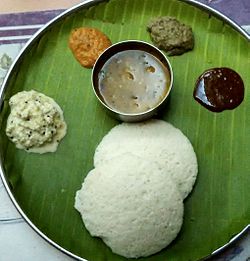Idli

Idlis with chutney and sambar
|
|
| Alternative names | Idly |
|---|---|
| Course | Main course |
| Place of origin | India |
| Region or state | South India |
| Serving temperature | Hot with a condiment such as sambar or chutney |
| Main ingredients | Black lentils (de-husked), rice |
| Variations | button idli, tatte idli, sanna, sambar idli, rava idli |
| |
|
| Nutritional value per 1 piece (30 gm) | |
|---|---|
| Energy | 167 kJ (40 kcal) |
|
7.89 g
|
|
| Dietary fiber | 1.5 g |
|
0.19 g
|
|
| Saturated | 0.037 g |
| Monounsaturated | 0.035 g |
| Polyunsaturated | 0.043 g |
|
1.91 g
|
|
| Minerals | |
| Potassium |
(1%)
63 mg |
| Sodium |
(14%)
207 mg |
|
|
| Percentages are roughly approximated using US recommendations for adults. Source: |
|
Idli /ɪdliː/) is a traditional breakfast in South Indian households. Idli is a savoury cake that is popular throughout India and neighbouring countries like Sri Lanka. The cakes are made by steaming a batter consisting of fermented black lentils (de-husked) and rice. The fermentation process breaks down the starches so that they are more readily metabolized by the body.
Idli has several variations, including rava idli, which is made from semolina. Regional variants include sanna of Konkan and Enduri Pitha of Odisha.
A precursor of the modern idli is mentioned in several ancient Indian works. Vaddaradhane, a 920 CE Kannada language work by Shivakotiacharya mentions "iddalige", prepared only from an black gram (urad dal) batter. Chavundaraya II, the author of the earliest available Kannada encyclopaedia, Lokopakara (c. 1025 CE), describes the preparation of this food by soaking black gram in buttermilk, ground to a fine paste, and mixed with the clear water of curd and spices. The Western Chalukya king and scholar Someshwara III, reigning in the area now called Karnataka, included an idli recipe in his encyclopedia, Manasollasa (1130 CE). This Sanskrit-language work describes the food as iḍḍarikā. The food prepared using this recipe is now called uddina idli in Karnataka.
...
Wikipedia
